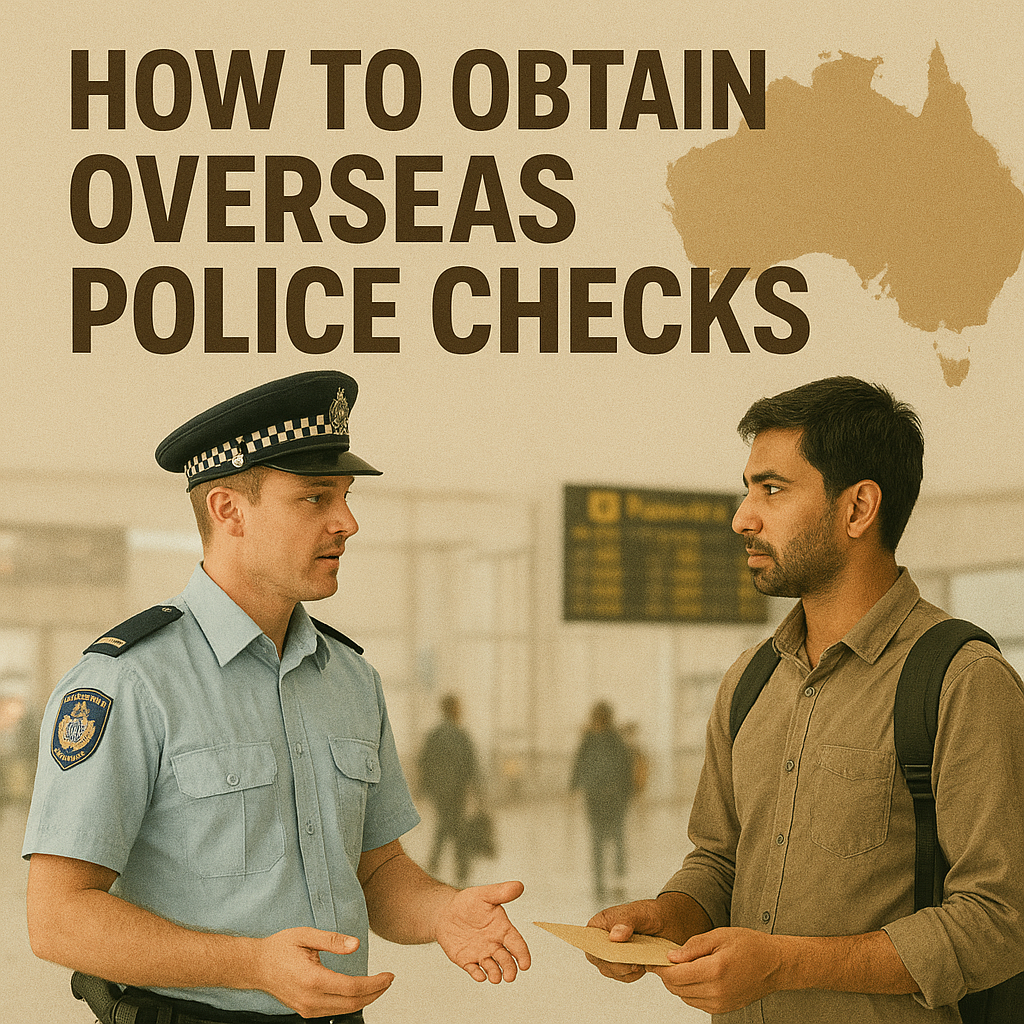Learn how to obtain overseas police checks for visa and immigration applications. Get detailed steps, country-specific tips, document requirements, and validity info.
Introduction
Obtaining an overseas police check is a critical step in visa applications and immigration processes worldwide. Many applicants face delays or confusion due to the varied requirements across countries. For example, Australian immigration law requires police certificates from every country where an applicant lived for 12 months or more in the last 10 years. This article explains how to obtain overseas police checks effectively by outlining the process, key challenges, and practical tips to ensure your certificates meet immigration standards and avoid costly delays.
Understanding Overseas Police Checks and Why They Matter
An overseas police check (also called a criminal record check or certificate of good conduct) is an official document that confirms whether you have any criminal convictions in a foreign country. Immigration authorities use these certificates to assess the character requirements of visa applicants, ensuring public safety and integrity.
Key reasons for requesting these checks include:
- Support of visa applications such as permanent residency, student, or work visas
- Meeting immigration rules concerning character and security
- Providing evidence for employment or volunteering overseas
- Obtaining clearances for child protection or sensitive occupations
Authorities like the Australian Department of Home Affairs and the UK Home Office specify stringent requirements around the currency, legibility, and official status of overseas police certificates.
Step 1: Determine Your Relevant Countries and Timeframes
You must identify all countries where you have lived for a continuous or cumulative period as required by the visa rules. For Australia, this means countries where you stayed for 12 months or more after age 16 in the past 10 years.
Tips:
- Check specific visa guidelines for what duration triggers a requirement.
- Include countries of birth or citizenship if requested.
- Prepare a detailed residential history with exact dates and addresses to avoid omissions.
Failing to disclose a required country’s police certificate can lead to visa refusal.
Step 2: Identify the Authority to Apply To for Each Country
Each country has different agencies issuing police certificates. These include:
- National or federal police authorities
- Ministries of Justice or Interior
- Accredited third-party verification agencies
- Consulates or embassies overseas
For example:
- The ACRO Criminal Records Office (UK) issues police certificates for UK residents applying abroad.
- The Australian Federal Police (AFP) handles police checks for those in Australia or with Australian residence.
- The FBI processes criminal history checks for the USA, often requiring fingerprints and an FBI channeler.
Check the respective government or police websites for official application portals and guidance. The UK’s GOV.UK website and Australia’s AFP site provide comprehensive country-specific links.
Step 3: Gather Required Documents and Information
Typical application requirements include:
- Valid passport or national ID
- Proof of current and past addresses covering the requested time period
- Signed consent forms (often mandatory for privacy reasons)
- Fingerprints, if required (common for the USA, Canada, and some European countries)
- Application fee payment (varies widely)
- Correctly completed application forms
Translations may be required if certificates are not in English; only professional translations are usually accepted. Documents with unclear scans, missing official stamps, or without English-language certification risk rejection.
Step 4: Submit Your Application and Await Processing
Methods of submitting applications vary:
- Online portals with identity document uploads and digital consent
- Postal applications including certified copies and payment cheques
- In-person applications at police stations or consulate offices
Processing times range significantly—from same-day issuance in some countries (like UAE) to multiple months in others. Plan well in advance, especially for visa timelines.
Some countries may reject or not issue certificates if:
- You are no longer a resident
- You lack local identification or proof of residency
- Your records include sensitive legal conditions (sealed records or pardons)
Step 5: Validate Certificate Format, Date, and Official Status
Immigration agencies require certificates to:
- Be issued on official letterhead or government stationery
- Include a government or agency stamp (often in English or accompanied by certification)
- Be issued within a prescribed validity period (commonly within 3–12 months prior to visa application)
- Contain clear, legible text and full identification details (full name, date of birth)
Blurred copies, uncertified translations, or outdated certificates may cause delays or refusal.
Dealing with Common Challenges
- If you cannot obtain a certificate from a country: Provide a detailed explanation or statutory declaration. Authorities may accept exceptional circumstances.
- Multiple countries’ certificates: Submit each separately and keep records organized by country and date.
- Fingerprinting requirements: Some jurisdictions require fingerprints either at local police stations or through authorized third parties—plan for additional time and possible travel.
- Language barriers: Use official certified translators to avoid rejection.
- Lost or expired certificates: You will need to reapply; some countries allow expedited services for a fee.
Special Considerations for Australian Visa Applicants
Australian immigration policy requires police certificates for:
- Any country where you lived for 12+ months continuously or cumulatively in the last 10 years while aged 16 or over.
- Certificates are required for visa applicants and adult family members.
- The Department of Immigration stresses professionally translated documents and certificates issued on official letterhead with English stamps.
The Australian Federal Police check is required for applicants with Australian residence exceeding 12 months. It can be done online with personal consent and identity documentation.
Tips for a Smooth Overseas Police Check Process
- Start early—some countries take months to process certificates.
- Confirm application steps directly from official government sources.
- Keep digital and physical copies safely indexed by country.
- Pay close attention to translation and certification requirements.
- Use tracked postal services or verified online portals.
- If unsure, consult migration agents or legal advisors experienced in immigration compliance.
Conclusion
Obtaining overseas police checks is often a complex but crucial prerequisite for immigration and visa approvals. Thoroughly identify which countries require certificates, submit complete and correctly translated documentation, and respect processing timelines to ensure a successful outcome. Being well-prepared and informed will minimize delays and satisfy stringent character requirements.


